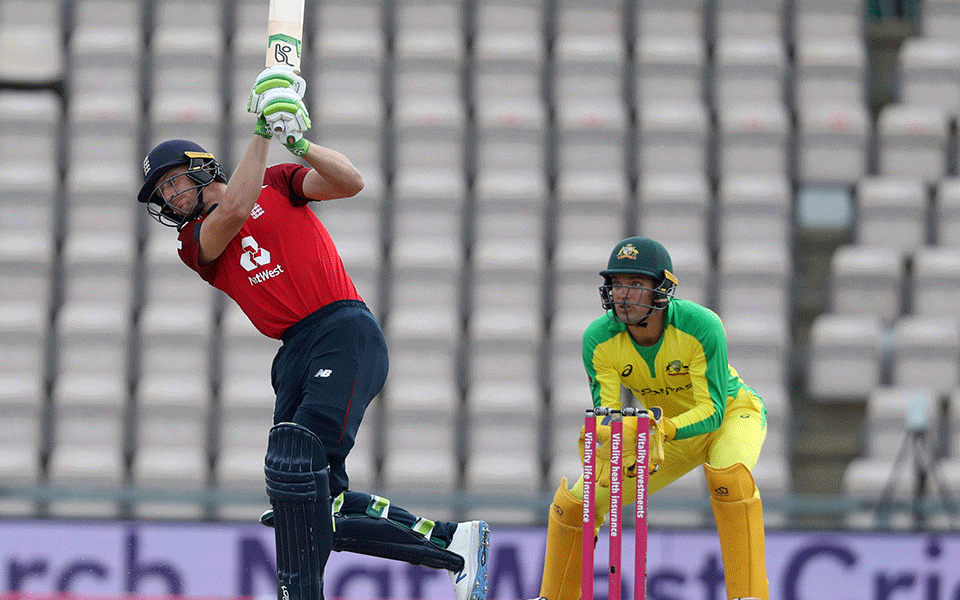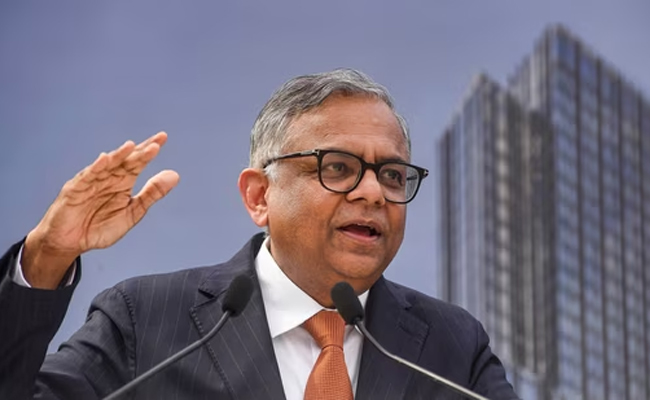Southampton: England beat great rival Australia by two runs in a Twenty20 thriller that went down to the final ball to take a 1-0 lead in the three-match series here.
Chasing 163 to win at the empty Rose Bowl on Friday, Australia collapsed from 124-1 after 14 overs to fall short on 160-6 in its first match of international cricket in six months because of the coronavirus pandemic.
After losing four wickets for nine runs off 14 balls, the Australians needed 26 runs off the final three overs, 19 off the final two and then 15 off the last, bowled by Tom Curran.
Marcus Stoinis hit a huge six over cover off the second ball to leave the tourists needing nine runs off four, but couldn't hit another boundary.
Australia was handed a brilliant start to the chase as captain Aaron Finch (46) and David Warner (58) shared a 98-run opening stand. Things started going downhill, though, after the loss of Steven Smith for 18 to make it 124-2 and Glenn Maxwell four balls later for 1, both falling to the spin of Adil Rashid.
"We knew England would keep coming hard," Finch said, "and we probably struggled to find the boundary in that 12- to 18-over mark. That's something to work on."
England eked out a total of 162-7 mainly thanks to Dawid Malan (66) and Jos Buttler (44). No other player reached double-figures, with Kane Richardson having figures of 2-13 and Maxwell getting 2-14.
"I thought we were 15 runs light," Malan said, "probably one partnership away from getting to 175-180."
It was the first time England has defended a target under 180 since 2016.
The top-ranked Australians hadn't played since mid-March when their scheduled ODI series against New Zealand was abandoned. England can wrap up the series by winning the second match back at the Rose Bowl on Sunday.
Let the Truth be known. If you read VB and like VB, please be a VB Supporter and Help us deliver the Truth to one and all.
Moscow (PTI): Russian President Vladimir Putin is making all possible efforts to de-escalate the crisis in the Gulf and is in close contact with the regional leaders as Iran is retaliating with massive strikes on the US facilities and infrastructure on their territories, the Kremlin said on Tuesday.
The US and Israel launched joint strikes against Iran on Saturday, assassinating 86-year-old Supreme Leader Ayatollah Ali Khamenei, alongside family members, including his daughter and grandchildren. Since then, Iran has targeted multiple US bases in the surrounding Gulf States.
"Putin will certainly make every effort to facilitate at least a minor easing of tensions. In this regard, we discussed with virtually all of our interlocutors yesterday," the Kremlin spokesman Dmitry Peskov said.
"Taking advantage of the dialogue we maintain with the Iranian leadership, (President) Putin will convey his deep concern regarding the strikes on their infrastructure to our colleagues in Iran," he added.
According to the Kremlin, Putin spoke by telephone with leaders of Bahrain, Qatar, the UAE, and Saudi Arabia.
In his telephonic conversation with Crown Prince and Chairman of the Council of Ministers of the Kingdom of Saudi Arabia, Mohammed bin Salman, Putin discussed the escalating situation in the region as a result of the American-Israeli armed aggression against Iran.
“Both sides expressed serious concern over the real risks of escalation of the conflict, which has already affected several Arab countries and is fraught with catastrophic consequences. In this context, Vladimir Putin underscored the urgent need to resolve the current extremely dangerous situation through political and diplomatic means,” the Kremlin said.
On Monday, Putin also had telephonic contacts with the King of Bahrain, Hamad bin Isa Al Khalifa, who currently chairs the Gulf Cooperation Council, Emir of the State of Qatar, Tamim bin Hamad Al Thani, and President of the United Arab Emirates, Mohammed bin Zayed Al Nahyan.
“Exchange of views was held regarding the unprecedented escalation around Iran as a result of US and Israeli aggression, which is bringing the entire region to the brink of a full-scale war with unpredictable consequences. Sides underscored the need for a swift cessation of hostilities to prevent the situation from spiralling completely out of control and to return it to a political and diplomatic framework,” the Kremlin said.
The current developments, in particular, threaten the security of many Arab states with which Russia maintains friendly relations.
Given this, President Putin reaffirmed Russia's readiness to use all available means to actively contribute to stabilising the situation in the region, the Kremlin said, adding that contacts with the Gulf leaders will continue.





